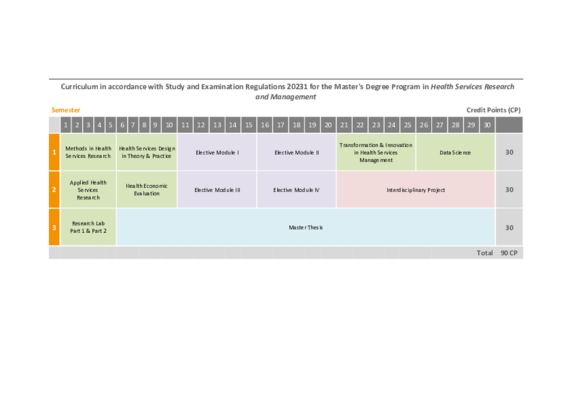About the degree programme
► Why study Health Service Research and Management?
Sustainable and evidence-based innovations are necessary to meet the socio-demographic changes as well as social developments in our society and the constant technical progress in health care.
In order to develop, implement and evaluate innovative solutions that meet and counteract the challenges of health care, a comprehensive understanding of health care structures is necessary. But it also requires methodological competencies to systematically and participatively identify the gaps in demand with the relevant stakeholders and to develop appropriate care concepts. There is already a high demand for specialists with relevant expertise in health services research, health care and health services management at regional, national and global level, and this demand is expected to grow strongly in the future.
► Why study the program at TH Rosenheim?
- Dealing with current topics such as digitalization in health care.
- Flexibility in the content of the degree program through elective options
- Personal and professional development through project work
- Exciting combination of research, management and current practice in healthcare provision
- Opportunity to generate innovative approaches to solutions, taking into account current developments and trends in healthcare delivery
- Variety in teaching and learning formats
- Application-oriented and structured curriculum
- Interdisciplinarity of students and lecturers
- Intersectoral and interprofessional networking
- High practical relevance
- Close cooperation with renowned regional and international practice partners mainly in the health region of Upper Bavaria
Perspective:
► Expanding one's career opportunities.
► Work interdisciplinarily and at eye level.
► Become a shaper of innovative health care.
Become part of the interdisciplinary, project-oriented master's program in healthcare research and management at TH Rosenheim!
Course content
The program is modular and interprofessional. In concrete terms, this means that students with competencies in areas such as diagnosis, therapy methods and service provision in the healthcare sector study together with fellow students who have competencies in areas such as the financing and remuneration of healthcare services. These perspectives are based on different theoretical foundations and logics of action. The strength of the program is to sensitize students to the different perspectives, to reflect on them, to analyze them and to integrate them into decision-making processes through this interprofessional exchange in the program.
Career Opportunities
The possible fields of application for graduates are wide-ranging in numerous areas of health care, in which an in-depth understanding of person-centered care and interprofessional forms of care as well as their systematic and multi-perspective analysis and optimization are required. The master's degree enables students to act responsibly in, for example:
- Primary care facilities as well as inpatient and outpatient health care,
- social insurance companies,
- Companies in the medical technology and pharmaceutical industries,
- Institutions of prevention, rehabilitation and aftercare as well as in health tourism,
- health and health care research institutions, and
- Institutions of the public health service, as well as interfaces between different institutions.
Application and admission
Admission requirements
- The prerequisite for admission to the master's program is a university degree as a bachelor's degree in a health, nursing or therapy science program or in the field of study of management in the health care industry, health economics or a degree acquired in Germany or abroad that is equivalent to such a university degree.
- A relative overall grade is required that is within the best 90% of the comparison group according to the ECTS grade distribution scale.
Personal requirements
Students should be open-minded and interested in analyzing complex interrelationships in an interdisciplinary and future-oriented manner. A high degree of independence and the ability to work in a team are also required.
Contact
-
Personal page of Michaela Schunk

Prof.Dr. Michaela Schunk
Professor of Methods in Health Service Research+49 (0)8031 / 805 - 2965 michaela.schunk@th-rosenheim.de -

Prof.Dr.rer.pol Sebastian Robert
Professor für IT- und Datenmanagement in der Gesundheitswirtschaft / Schwerpunktprofessur Digital Health und KI im Gesundheitswesen+49 (0)8031 / 805 - 2534 sebastian.robert@th-rosenheim.de -
Lecturers
-

Prof.Dr. Thomas Hammerschmidt
Studiengangsleiter MGW / Professor für Pharmamanagement+49 (0)8031 / 805 - 2514 thomas.hammerschmidt@th-rosenheim.de -

Prof. Felix Höpfl
Professor für Personalmanagement im Gesundheitswesen+49 (0)8031 / 805 - 2976 felix.hoepfl@th-rosenheim.de -

Prof.Dr.rer.pol Sebastian Robert
Professor für IT- und Datenmanagement in der Gesundheitswirtschaft / Schwerpunktprofessur Digital Health und KI im Gesundheitswesen+49 (0)8031 / 805 - 2534 sebastian.robert@th-rosenheim.de -

Prof. Elisabeth Wildmoser Dipl.-Med.-Päd.
Professorin für Rehabilitation des Bewegungssystems+49 (0)8031 / 805 - 2487 elisabeth.wildmoser@th-rosenheim.de

![[Translate to English:] zwei Studentinnen und ein Student unterhalten sich am Tisch](/fileadmin/_processed_/6/e/csm_rosenheim_1-1537_Farbretusche_Master_VFM_ef5d0873f7.jpg)
